From Vision to Vanguard
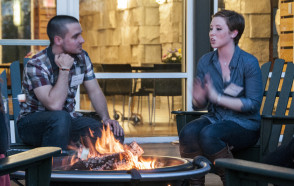
October 4, 2017
It’s 8 a.m. at the Starbucks on Greencastle’s town square. People flow in and out on their way to work, stopping for brief conversations with friends and colleagues who share the morning ritual.
Away from the foot traffic, Andrew Cullison hunches over his phone on a stool in the front window, zoomed-in on a PDF he’s just received. The document contains draft logos for the Association for Practical and Professional Ethics (APPE), recently relocated to DePauw University’s Janet Prindle Institute for Ethics, which Cullison directs. As Cullison mulls over different logo designs, he notices a familiar face—his first meeting of the day—has just walked in.
“What do you think about number 4?” he asks, holding his phone up for his guest.
It’s not the kind of question ethics scholars usually grapple with. But it’s exactly the kind of greeting you might expect from Cullison—and a reason why APPE moved its offices an hour north, from Bloomington to Greencastle. For APPE, the change of scenery opened new possibilities for collaboration and outreach. Prindle wasn’t just engaged in scholarship. They were making ethical inquiry exciting and relevant for new audiences.
MEETING DEMAND
Prindle opened its doors in 2007, built with support from Janet W. Prindle ‘58, a pioneer for women on Wall Street and champion of socially responsible investing. The timing was perfect. Public interest in ethics—corporate ethics in particular—began to skyrocket around the same time. In the last decade, consumers have increasingly aligned with companies that support social and environmental causes, whether or not those causes are directly related to their business.
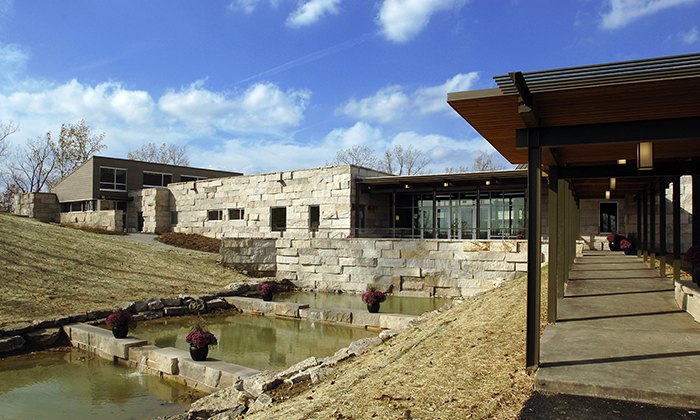 The Prindle Institute was the first building in Indiana to receive a 'Gold' rating from the US Green Building Council.
The Prindle Institute was the first building in Indiana to receive a 'Gold' rating from the US Green Building Council.
Millennials, who came of age during the rise of hybrid vehicles and free-range chicken, have been the most responsive to these overtures. A 2015 study found that “more than 9-in-10 millennials would switch brands to one associated with a cause,” and were “prepared to make personal sacrifices to make an impact on issues they care about, whether that’s paying more for a product, sharing products rather than buying, or taking a pay cut to work for a responsible company.”
But millennials are also skeptical of anybody or anything that claims to speak for them. In April 2017, Pepsi released a new ad featuring a dancing, protesting Kendall Jenner. The backlash on social media was immediate and overwhelming. Pepsi recalled the ad the next day. In the words of Emily Troyer ‘19, who wrote about the episode for The Prindle Post, Prindle’s commentary website, “When does profit from important issues cross the line to exploitation?”
NEW FRONTIERS
Located off-campus in the DePauw Nature Park and connected by hiking trails to field stations and a reflection center, Prindle mirrors the stone and wood of a nearby abandoned quarry that has quickly been reclaimed by nature.
Activity inside the building belies its tranquil setting. At a glance: The Institute runs a current events website, a podcast and an academic blog for philosophers. The Young Philosophers series brings the field’s rising stars to DePauw’s campus for TED Talk-inspired presentations, and the annual Undergraduate Ethics Symposium draws students from colleges and universities from around the country. Few places on campus are as popular for daytime retreats or evening reading groups; visitors from on and off campus have booked Prindle’s conference spaces for nearly every day of the last two academic years.
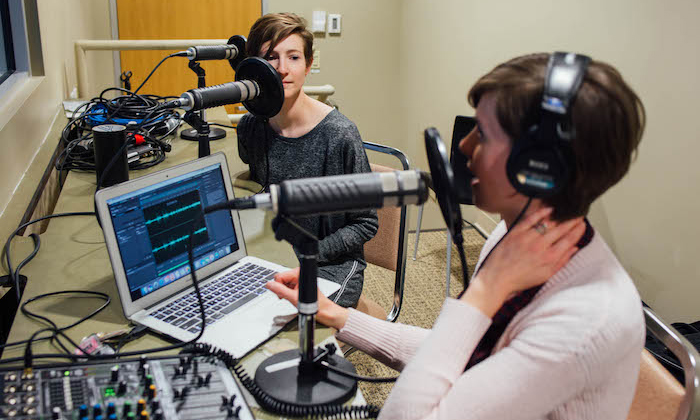 Graduate Fellow Eleanor Price (DePauw '17) records Examining Ethics, Prindle's podcast, with Producer Christiane Wisehart.
Graduate Fellow Eleanor Price (DePauw '17) records Examining Ethics, Prindle's podcast, with Producer Christiane Wisehart.
Lovingly referred to as “the two Bobs” by staff members, Prindle’s first two directors set much of it in motion. Robert G. Bottoms, who took the job after retiring as DePauw’s 18th president, used his background as an executive and fundraiser first to build the Institute and then to put it on financially stable ground. Bob Steele '69, a scholar at the Poynter Institute and a fellow of the Society of Professional Journalists, drew on decades of experience in journalism to create new internships and programming in professional ethics.
When epistemologist-slash-technophile Cullison arrived in 2014, he inherited an ethics center primed and ready for what was to come.
“Prindle had the resources to accomplish things that very few ethics institutes in the country could accomplish,” Cullison says. “And I had more staff—really, really talented staff—than anybody before me. My thought was, well, what can we do with that?”
Cullison is from a different generation than his predecessors and is outwardly a product of his time. Under his directorship, Prindle has aggressively expanded into the world of digital media where he and Prindle’s audiences—near and far—live. Even the office culture is more in line with Buzzfeed than an academic center. Conversations between interns and staff go back and forth on Slack, a business-oriented chat service familiar in tech and media startups, with editorial decisions and meeting plans punctuated by animated GIFs and emoji.
The transformation was shocking for its speed, if not its ambition. Linda Clute, Prindle’s long-time operations manager, remembers hearing about Cullison, a 2001 DePauw graduate, from one of his former professors who had served on the hiring committee. Clute and others had a sense of what to expect from Cullison before he'd even stepped into his office.
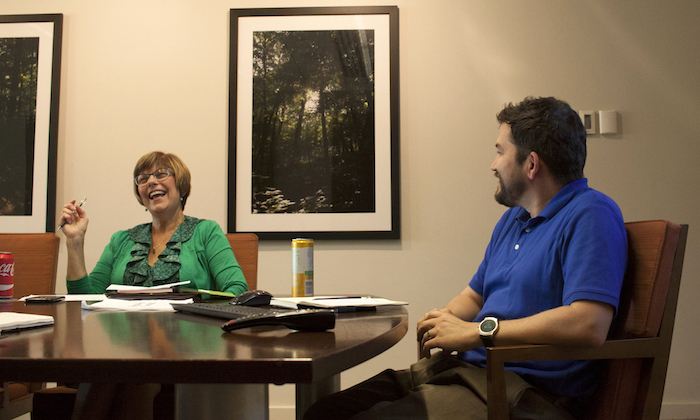 Operations Manager Linda Clute helps keep Cullison on track. "I can count on her to tell me if there’s something I need to think twice about," he says.
Operations Manager Linda Clute helps keep Cullison on track. "I can count on her to tell me if there’s something I need to think twice about," he says.
“I can clearly remember the day Andy started,” Clute says. “I was driving down the road on the way to work, thinking to myself, ‘Okay, buckle up. It’s going to be a wild ride because this guy has a lot of ideas.’”
Within a few months, Prindle had launched The Prindle Post, a “news explainer” website that pulls commentary from external scholars and DePauw students alike. The Post has since become Prindle’s flagship, blurring the lines between DePauw and the outside world, scholarship and practical experience.
THE LOOP
Conner Gordon, a Prindle graduate fellow and 2016 DePauw alum, has guided the Post's content over the last two years. Gordon has been a consistent presence on the Post since his time as a student, having traveled to cover the Presidential Inauguration, the subsequent Women’s March and Ferguson. But as editor, his job is twofold: develop engaging stories and the student talent behind them.
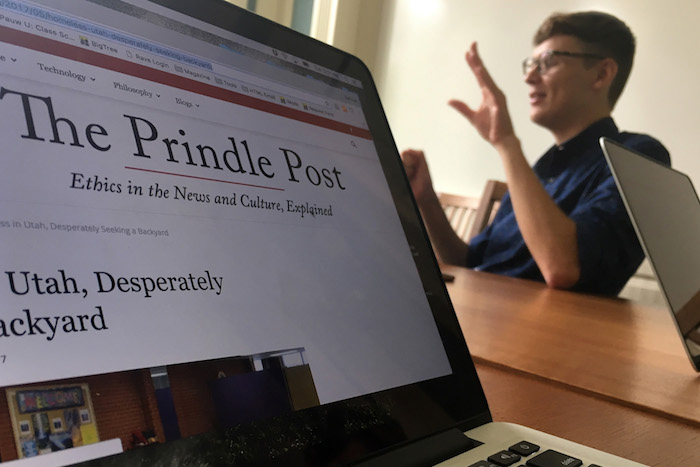 Graduate Fellow Conner Gordon (DePauw '16) explores a topic during a meeting with The Post's student writers.
Graduate Fellow Conner Gordon (DePauw '16) explores a topic during a meeting with The Post's student writers.
During a recent meeting on campus, Gordon and his team of student writers spent an hour bouncing ideas off each other. Only a few years removed from being in their place, he offered constructive feedback on their upcoming stories and advice on using local sources for investigative journalism. Outside, a group of prospective students passed by on a campus tour. The next Post writers might have been among them. Maybe the next Gordon.
In this way, Prindle has created a feedback loop. By adding more outward-facing programs, they’ve needed more student involvement, which has created new and better programs.
Every summer as students are returning to campus, Prindle hosts an open event called Prindlepalooza, a kickoff party that has been a vehicle for Prindle’s recruitment. Attendance has doubled every year over the last four years, from 70 students in 2014 to nearly 500 this past summer, half of them first-years.
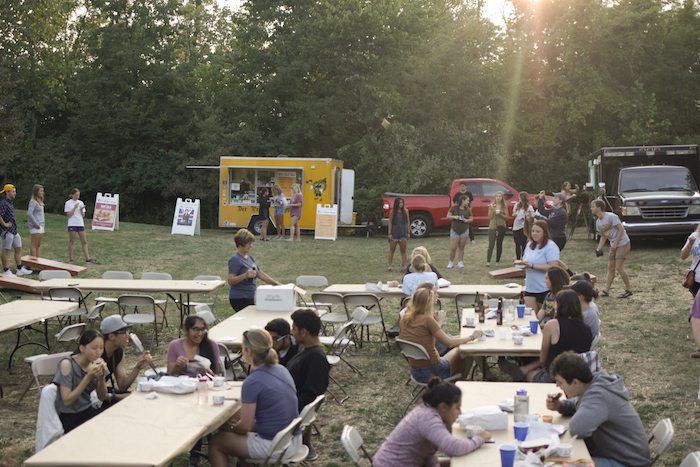 DePauw students retreat to Prindle for events such as Prindlepalooza, which attracted record numbers in 2017.
DePauw students retreat to Prindle for events such as Prindlepalooza, which attracted record numbers in 2017.
As awareness of their programming has grown, so has competition for Prindle’s student internships. One intern told Cullison she was glad she applied three years ago—the talent level had increased that quickly. And with it, so has everything Prindle touches.
“I don’t think anybody thought this place would be what it is right now,” Clute, Cullison’s second-in-command, says. “And there’s still much more to be done.”
Back